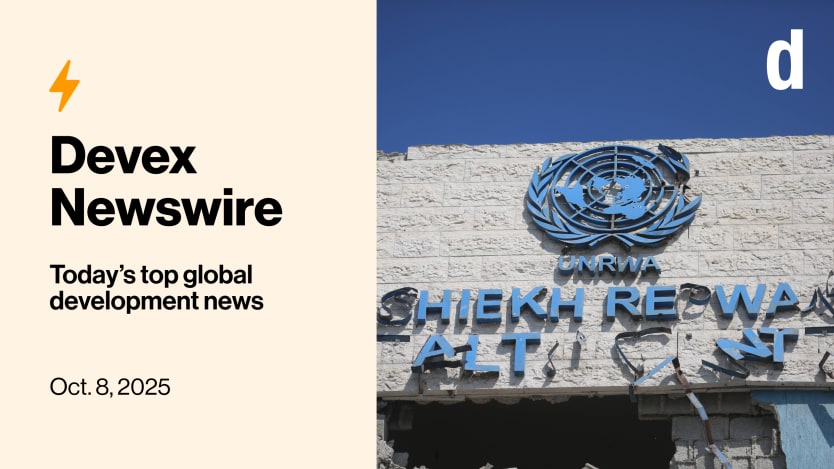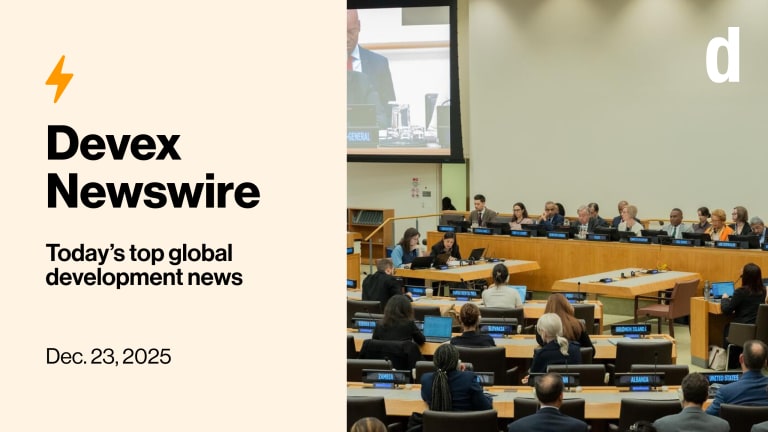Presented by Paris Peace Forum

On the heels of the second anniversary of the Oct. 7 Hamas attack on Israel, workers of UNRWA, the U.N. agency helping Palestinian refugees, warn of possible financial collapse. Funding cuts, Israeli restrictions, and U.N. reforms have left UNRWA shaky. If it folds, nearly 6 million Palestinian refugees could lose health care, schools, and aid.
Also in today’s edition: Asia looks to sustainability, and a Soros fund makes new commitments in Africa.
+ Happening today at 1 p.m. ET: Devex Senior Reporter Adva Saldinger will be joined by Clemence Landers of the Center for Global Development and David McNair of ONE to discuss how the world’s multilateral development banks are adapting and evolving, and whether they can deliver for countries facing the greatest strains. Don’t miss this preview event on what to expect at next week’s WB-IMF annual meetings. Save your spot now.
UNRWA on the brink
The United Nations Relief and Works Agency for Palestine Refugees is facing what officials warn could be a “disastrous” collapse.
Created 75 years ago after the displacement of 700,000 Palestinians, UNRWA has always been fragile, relying on voluntary contributions. But funding cuts, Israeli restrictions, and U.N. reform pressures have pushed it to the edge. “Collapse is certainly an option; it’s a high likelihood if this whole funding model continues,” says Juliette Touma, UNRWA’s communications director.
UNRWA Commissioner-General Philippe Lazzarini has pleaded for support, describing the agency’s existence as shaky. A June U.N. reform report even warned of “the possibility of a disorderly collapse” amid financial strain and Israel’s “systematic effort to dismantle” its operations.
The stakes are staggering. Since Oct. 7, 2023, after the killings of over 1,200 Israelis at the hands of Hamas, more than 67,000 Palestinians have been killed, according to Gaza’s health ministry; millions displaced; and 90% of homes destroyed. In the West Bank, settler violence and displacement have surged. Over 360 UNRWA staffers have also been killed — the highest toll ever for a U.N. agency.
Israel has long accused the U.N. agency of ties to Hamas and anti-Semitic teachings. Since Oct. 7, however, tensions have exploded, with Israel banning UNRWA’s activities on its soil, shutting schools, blocking aid trucks, and arresting staff. “Israel has wanted for years to shut us down, and they’re very close to doing it,” says one current UNRWA official.
Funding is evaporating too, writes Clothilde Goujard for Devex. Gulf Arab states’ contributions dropped 90% this year, Sweden pulled out, and even long-time supporters are wavering. “Many of the UNRWA staff in Jerusalem and West Bank are looking for jobs because the prospect of job safety is very dark right now,” says one former UNRWA official.
If UNRWA folds, schools and clinics could close, host-country operations may scale back, and refugees would be left without a lifeline. “No other UN agencies or NGO does the work that UNRWA does,” Touma says.
Read: The mood inside UNWRA as workers fear financial collapse
Background reading: US, UN clash over beleaguered Palestinian refugee agency
Checks and balances
For years, communities across Asia have endured land grabs, forced evictions, toxic fallout, and environmental ruin at the hands of large corporations — often without recourse. Now, Thailand and South Korea are planning to change that by creating the region’s first binding human rights and environmental due diligence laws.
“I’m very hopeful to see that in Thailand and also in other jurisdictions in the region there are these movements to introduce responsible business laws,” says Ji Yoon Kang, staff attorney at GongGam Human Rights Law Foundation and representative of KTNC Watch.
Asia has no equivalent to the EU’s Corporate Sustainability Due Diligence Directive, leaving only voluntary frameworks, Devex contributing reporter Rebecca Root writes.
The abuses are widespread: Adidas, Amazon, and Samsung are tied to forced labor in China; Korindo Group is accused of torching Indonesian forests; nickel mines in the Philippines pollute Indigenous lands. “Now more than ever, we need strong laws to regulate business activities and to hold companies accountable,” says Neïla Mangin Maïza of Manushya Foundation.
South Korea’s bill, modeled on Europe’s German Supply Chain Act, was reintroduced this year after failing in 2023. Its push was fueled by the 2021 Myanmar coup, says Kang: “There were Korean companies that were heavily related to the junta … so that was our rationale and motivation.”
Thailand’s draft is less advanced, but if passed, it would require due diligence, grievance mechanisms, and compensation for harmed communities.
Still, laws alone won’t be enough in a region where 468 environmental and human rights defenders have been murdered since 2012. “Corporate capture, corporate lobbying, corruption; those are the breeding grounds of corporate abuses and failing democracies,” Mangin Maïza warns.
Read: Asia looks to up its corporate sustainability game (Pro)
+ Not a Devex Pro member yet? Start your 15-day free trial of Devex Pro today and gain immediate access to in-depth analyses, insider insights, funding database, curated events, and much more. Check out all the exclusive content available to you.
Soros material
The Soros Economic Development Fund, or SEDF, the impact investment arm of the Open Society Foundations, has revealed $55 million in new commitments to boost clean energy access and climate-resilient infrastructure across Africa.
The investments — which include contributions to the Alliance for Green Infrastructure in Africa, the Helios CLEAR Fund, and Persistent Africa Climate Venture Builder Fund — aim to drive inclusive green growth led by African investors and entrepreneurs, according to a press release.
The initiative, says CEO Georgia Levenson Keohane, comes amid shrinking global climate finance, and positions SEDF to take on higher-risk projects that advance Africa’s energy transition.
“We invest because of, not in spite of, these risks,” she says, noting that the fund’s approach focuses on African ownership and seeks to unlock private capital for clean energy and infrastructure.
Related: Environment ministers mull climate finance, Africa’s development future
Language barrier
Imagine starting school and realizing every word is in a language you don’t understand. For millions of children across the global south, that’s one of the factors fueling a learning crisis where 70% of 10-year-olds in low- and middle-income countries can’t read a simple text, according to the World Bank.
For Mamadou Amadou Ly, executive director of the Senegalese NGO Associates in Research and Education for Development, or ARED, the issue is personal. “Even during recess, if we spoke one word that wasn’t French, we were given a symbol of shame and everyone laughed at us,” he tells Devex contributor Sophie Edwards.
Ly now leads ARED’s Harmonized Bilingual Education Model, which begins by teaching children in their mother tongues, such as Wolof or Pulaar, alongside French, and then gradually shifts to full French instruction by grade six. The approach earned him the 2025 Yidan Prize for Education Development and $3.8 million to scale further.
From a 14-classroom pilot in 2009, ARED now reaches more than 8,200 schools nationwide. Evaluations show dramatic gains, with one program improving word reading by 134% in a single year.
Scaling hasn’t been easy — the COVID-19 pandemic and U.S. aid cuts slashed funding — but ARED continues with backing from the Gates Foundation, Hewlett Foundation, Dubai Cares, and Echidna Giving. Senegal now aims to make bilingual education standard by 2029.
“You see the child in the classroom — he doesn’t speak, he doesn’t move, he doesn’t know how to act. Then you go next door, where the lesson is in a language he understands, and he is blooming, happy to learn. That is the difference,” Ly says.
Read: Boosting learning through bilingual instruction in Senegal
In other news
Ben Black was confirmed yesterday to lead the U.S. International Development Finance Corporation. [Bloomberg]
Luis Vayas Valdivieso, the chair of the stalled U.N. plastics treaty negotiations, is expected to step down amid reports of internal pressure on him to resign. [The Guardian]
A draft EU document shows that Brussels plans to push global development banks to scale up climate action and align with the Paris Agreement, setting up a clash with the U.S., which has urged the World Bank and IMF to refocus away from climate issues. [Reuters]
Sign up to Newswire for an inside look at the biggest stories in global development.








